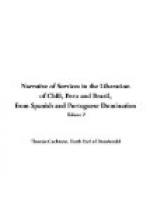The two following days were occupied in making rocket rafts, and in getting ready life-preservers for the men, in case of their falling from the rafts. On the 1st of October the Galvarino, Puyrredon, and Araucano, stood into the bay to reconnoitre, and sustained a heavy fire from the shore, upon which I ordered the Independencia to their aid; but that vessel was brought to an anchor when at the distance of several miles from them. On the same day Lieutenant-Colonel Charles, a most able and gallant officer, reconnoitred in a boat, and made trial of some rockets, upon which he reported unfavourably.
In this affair the mast of the Araucano was struck by a round shot, and severely damaged—the circumstance being merely mentioned to shew the state in which the squadron was equipped; the only means of repairing the damage being by fishing the mast with an anchor-stock taken from the Lautaro, whilst an axe had to be borrowed for the purpose from the flag-ship!
On the 2nd, the Araucano again went in, accompanied by a squadron of boats under the command of Captain Guise, and fired several rockets, but with no perceptible effect—the Spaniards having unrigged their ships; the brig sustained considerable damage from the firing of the forts and shipping.
After dark, an attack by rockets and shells was arranged, the Galvarino taking in tow a mortar raft, under the command of Major Miller, and placing it, under a heavy fire, within half a mile of the enemy’s batteries. The Puyrredon followed with another raft, carrying the shells and magazine; the Araucano took charge of a rocket-raft, under Captain Hind, whilst the Independencia towed in a second rocket-raft, under Lieut-Colonel Charles, the rest of the squadron remaining at anchor.
Great expectations were formed, as well by myself as the whole squadron, as to the effect to be produced by these destructive missiles, but they were doomed to disappointment, the rockets turning out utterly useless. Some, in consequence of the badness of the solder used, bursting from the expansive force of the charge before they left the raft, and setting fire to others—Captain Hind’s raft being blown up from this cause, thus rendering it useless, besides severely burning him and thirteen men: others took a wrong direction in consequence of the sticks not having been formed of proper wood, whilst the greater portion would not ignite at all from a cause which was only discovered when too late. It has been stated in the last chapter that the filling of the tubes was, from motives of parsimony, entrusted to Spanish prisoners, who, as was found on examination, had embraced every opportunity of inserting handfulls of sand, sawdust, and even manure, at intervals in the tubes, thus impeding the progress of combustion, whilst in the majority of instances they had so thoroughly mixed the neutralizing matter with the ingredients




